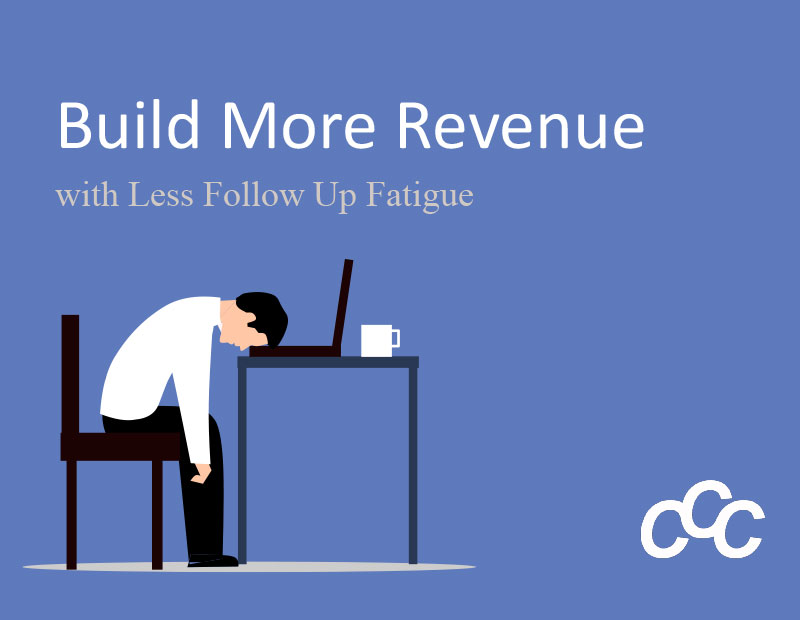Many businesses see the need for a CRM to manage their sales and marketing. However, choosing the best CRM can be overwhelming. In two previous articles, we talk about choosing a CRM to fit your business needs and 3 non-negotiables when shopping for a CRM. When you have the right CRM and use it properly, you will see increased sales with less Follow Up Fatigue. But what happens when the CRM is not implemented correctly? You and the team are frustrated and annoyed and your money is wasted.
There are many reasons a CRM implementation can fail, and below are three key reasons. If you address each area properly before you implement your CRM, you will have a much higher success rate.
Reason #1: The CRM implementation does not include a plan
If you want to build a beautiful house that will last, you need a plan. A CRM is no different. A CRM is a big undertaking and when a business does not prepare for the implementation, it can be a disaster. What goes into planning? There are several factors:
- Identify your business goals and your budget
- Define your marketing and sales funnels to replicate in the CRM
- List your repetitive, manual tasks in your marketing and sales processes
- Consolidate your customer and prospect data for migration
- Identify user roles and how each department will use the CRM
When a business recognizes that they need a CRM and signs up for a subscription without a plan, the risk of failure is high, and it can be costly. A strategic plan is crucial for the success of a CRM implementation.
Reason #2: Leadership does not get team buy-in
As a business grows, senior-level leaders look for ways to grow sales and streamline processes to create more productivity. These efforts succeed when the team understands their importance. To have your team on board for the CRM:
- Involve them in the plan and the selection process
- Have a pilot team that includes real users
- Make sure the key administrator and senior leaders use the CRM as they can sabotage the implementation.
Unfortunately, many leaders integrate new processes but do not follow the processes themselves. When business leaders implement a CRM to improve sales and marketing but do not use the CRM themselves, they set an example of doing what I say, not what I do. How do you know if a leader is not adopting and using the CRM?
- The leadership brings in a consultant for CRM training but misses the training.
- The leadership continually reminds their team to use the CRM but does not use it themselves.
- The leadership inconsistently pulls people away from daily tasks to show a CRM process and then abandons the process.
- The leadership delegates CRM tasks because it is easier to have someone else do it.
The point is, leadership needs to lead in every area and that includes using technology. When the leadership does not build a habit of using the CRM, the risk of a CRM implementation failure increases by creating more work for the team and less enthusiasm to use the CRM.
Reason #3: The CRM is treated as a do-it-yourself project
The trouble begins when a business owner thinks a CRM implementation is just a one-click install like an app. This creates problems when a business has the do-it-yourself mentality. In other words, I’ll install it over the weekend and get everyone up to speed…until…the business owner realizes:
- The installation is just the beginning
- They do not know if they need to configure the settings for this or for that
- It will take ALL weekend because they did not plan
When the business owner realizes they are over their head, they set it the CRM aside and will deal with it later. The failure comes into play when they are paying for a CRM that sits on the shelf. The business owner has every intention to finish the implementation, but they do not have time or knowledge.
To avoid this pitfall, we recommend that the business works with a CRM consultant. The consultant has the experience to implement successfully. They will help the business with the following:
- Create an implementation plan
- Configure the CRM based on the business’s goals so that it is ready to use on day one
- Train the employees how to use it
- Provide ongoing support
Do-it-yourself CRM implementations do not have a support system and this raises the risk of failure. However, a CRM consulting company helps with the implementation and provides the support so a business can use the CRM successfully long after the implementation.
Conclusion
A proper CRM implementation can be the difference between business growth or stagnation and decline. An implementation is not done overnight. A successful implementation takes planning, strategy, and training.





